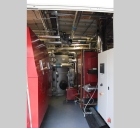Grammar school turns to biomass heating

The opportunity to implement a biomass-led heating system was taken up by Harrogate Grammar School when replacing aging boiler plant. The new equipment includes a Hoval STU biomass boiler supported by two UltraGas gas-fired condensing boilers. The new heating system was specified and installed by G&H Sustainability.
Harrogate Grammar School is a co-educational, independent academy trust with around 1700 pupils — including a large sixth form.
The new heating system comprises a 195 kW wood-pellet boiler and two 350 kW UltraGas condensing boilers. There is also a silo for storing locally sourced wood pellets. The pellet silo has a sensor to indicate when a fuel delivery is required.
Andrew Hudson of G&H Sustainability says, ‘We expect the biomass boiler to meet about 80% of the space-heating and hot-water requirements throughout the year.’
To facilitate installation in the small plant room, Hoval supplied the STU boiler in a plug-and-play skid-mounted configuration, complete with pumps, fans and fuel-delivery augurs, as well as the company’s FlameTronix touchscreen control system.








